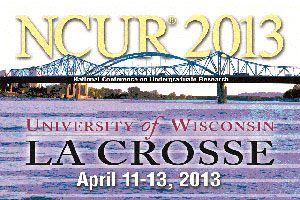Posted 6:28 p.m. Monday, Feb. 11, 2013

Two months from now, students, faculty, and staff from 48 states and seven countries will be on campus for the National Conference on Undergraduate Research.
 Article by UW-L student Melissa Moss
Two months from now, students, faculty, and staff from 48 states and seven countries will be on campus for the National Conference on Undergraduate Research (NCUR). From Thursday through Saturday, April 11-13, the undergraduates responsible for the 3,050 abstracts accepted for NCUR 2013 will occupy La Crosse and bring academic haven to campus.
This large number of abstracts accepted would not have been possible without the estimated 245 abstract reviewers. These reviewers, which included professors and faculty from UW-L, had the daunting task of accepting and rejecting from a stack of 3,431 abstracts.
So, what goes into the selection process? Students first chose which of the 12 disciplines their project fit into: biology, business, chemistry, communications, diversity, English, health science, history, math, physics, psychology or sociology. Then, there are four options for how they can present their research: oral, poster, visual arts exhibit or performing arts. Once research has begun and an abstract has been crafted, students submit their abstracts for review.
After abstracts were submitted, each reviewer was given between 10 and 20 abstracts to review, with about 30 days to decide whether or not it should be accepted or rejected. According to UW-L Biology Professor Scott Cooper, who is the director of Undergraduate Research and Creativity, “The reader should be able to quickly identify why the student did this work, how it was done, and what the results were.”
UW-L Physics Professor Robert Ragan was one of the NCUR abstract reviewers. "I looked at whether the abstract was well written, whether there was an interesting research question, whether there was a realistic methodology described and whether there were any preliminary results described,” he says. Once the initial abstract is created, students continue to develop their projects so they are presentation-ready.
UW-L student Bret Campion is one of the NCUR participants whose research was selected. Campion chose to research the role of social media in the Egyptian revolution and whether historians should collect social media postings as primary sources for historical research. As he prepares for his NCUR presentation, he hopes to go over his results and do further research as conditions in Egypt continue. He wants to ensure his presentation is both relevant and precise and accurately provides the most up-to-date information about the conflict in Egypt.
Article by UW-L student Melissa Moss
Two months from now, students, faculty, and staff from 48 states and seven countries will be on campus for the National Conference on Undergraduate Research (NCUR). From Thursday through Saturday, April 11-13, the undergraduates responsible for the 3,050 abstracts accepted for NCUR 2013 will occupy La Crosse and bring academic haven to campus.
This large number of abstracts accepted would not have been possible without the estimated 245 abstract reviewers. These reviewers, which included professors and faculty from UW-L, had the daunting task of accepting and rejecting from a stack of 3,431 abstracts.
So, what goes into the selection process? Students first chose which of the 12 disciplines their project fit into: biology, business, chemistry, communications, diversity, English, health science, history, math, physics, psychology or sociology. Then, there are four options for how they can present their research: oral, poster, visual arts exhibit or performing arts. Once research has begun and an abstract has been crafted, students submit their abstracts for review.
After abstracts were submitted, each reviewer was given between 10 and 20 abstracts to review, with about 30 days to decide whether or not it should be accepted or rejected. According to UW-L Biology Professor Scott Cooper, who is the director of Undergraduate Research and Creativity, “The reader should be able to quickly identify why the student did this work, how it was done, and what the results were.”
UW-L Physics Professor Robert Ragan was one of the NCUR abstract reviewers. "I looked at whether the abstract was well written, whether there was an interesting research question, whether there was a realistic methodology described and whether there were any preliminary results described,” he says. Once the initial abstract is created, students continue to develop their projects so they are presentation-ready.
UW-L student Bret Campion is one of the NCUR participants whose research was selected. Campion chose to research the role of social media in the Egyptian revolution and whether historians should collect social media postings as primary sources for historical research. As he prepares for his NCUR presentation, he hopes to go over his results and do further research as conditions in Egypt continue. He wants to ensure his presentation is both relevant and precise and accurately provides the most up-to-date information about the conflict in Egypt.